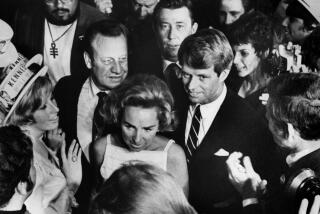Letitia Baldrige dies at 86; etiquette expert, author, columnist
Letitia Baldrige, an etiquette maven who served as social secretary to First Lady Jacqueline Kennedy and later wrote books and a syndicated column advising readers on good manners in contemporary America, has died. She was 86.
Baldrige died Monday at a nursing facility in Bethesda, Md., said Mary M. Mitchell, a longtime friend and writing collaborator. Baldrige had severe osteoarthritis with cardiac complications.
In 1960, Baldrige received a life-changing phone call from Jacqueline Kennedy, a friend from their days at a private girls’ school in Connecticut, who asked if she could help out at the White House. In her new role, Baldrige would come to arrange and oversee the glittering state dinners and other stylish social gatherings for which the Kennedy White House became known.
Baldrige left the White House in the summer of 1963 to join a Kennedy family business enterprise in Chicago. Months later, after President Kennedy’s assassination, she returned to assist the first lady in planning the president’s funeral, helping to create indelible, dignified images of a nation and a family at grief.
Known to friends as Tish, Baldrige went on to start her own public relations and marketing firm, Letitia Baldrige Enterprises, with offices in Chicago, New York and Washington.
She soon established herself as the nation’s leading arbiter of contemporary etiquette, writing a syndicated newspaper column, lecturing frequently and in 1978, updating Amy Vanderbilt’s “Complete Book of Etiquette.”
That same year, Time magazine put Baldrige on its cover, describing her in an accompanying profile as “a superbly energetic amalgam of feminist and Tasteful Lady.” The magazine also applauded her update of the classic Vanderbilt guide, saying she had “kicked the stuffiness out of it and inserted a clear-eyed, considerate feminism.”
She would eventually write a number of other etiquette books, among them “Letitia Baldrige’s Complete Guide to Executive Manners” in 1985, in which her recommendations included the practical notion that whoever reached a door first — man or woman — should simply open it.
She also wrote about manners related to weddings, child rearing and social lives. Baldrige even wove an anecdote about etiquette into her 1990 novel, “Public Affairs, Private Relations,” when one of the characters rearranges the place cards before a dinner party and is caught.
More than any hard and fast rules, Baldrige said frequently, kindness and consideration are at the heart of good manners.
“It’s thinking about somebody other than yourself. It’s being aware of other people and helping them out and not doing anything to offend them and just being nice,” she said in a 1990 interview with The Times. “And it hasn’t anything to do with money. It has everything to do with character.”
Letitia Baldrige was born on Feb. 9, 1926, in Miami and grew up in Omaha, the youngest of three children. Her father, Howard Malcolm Baldrige, was an Omaha attorney and state legislator who served two terms as a Republican congressman from Nebraska. Her brother Malcolm Baldrige would become Commerce secretary in the Reagan administration.
Along with the future first lady, Baldrige attended Miss Porter’s School, a private boarding school for girls in Farmington, Conn. She received a bachelor’s degree in psychology from Vassar College and did graduate work in psychology at the University of Geneva in Switzerland.
In 1951, she embarked on a career with the State Department but first had to complete a course in secretarial skills. That accomplished, she took a job in Paris as social secretary and advisor to U.S. Ambassador David Bruce, then served in Rome in a similar capacity for Clare Boothe Luce, the U.S. ambassador to Italy.
Before joining the White House, Baldrige was the public relations director, and first female executive, at Tiffany & Co. in New York.
But she remained best known for her association with the Kennedy White House, where she helped create the enduring image of elegance, youthful energy and sophistication that the president and first lady came to represent.
Baldrige also arranged some of the couple’s most sophisticated events at the White House, including setting up a portable stage where they hosted concerts, ballets, musicals and Shakespeare plays.
“It was an extraordinary time,” Baldrige told the Dallas Morning News in 1998. “Mrs. Kennedy did things in ways that no one had ever done them before. There had never been hard liquor served at state functions. She provided open bars. There had never been jazz, or opera ... or theater. They brought it all in. The way the Kennedys entertained set a standard.”
In addition to her volumes on etiquette, Baldrige wrote several books related to her White House career, including “In the Kennedy Style: Magical Evenings in the Kennedy White House” (1998), with former White House chef Rene Verdon, and “A Lady First: My Life in the Kennedy White House and the American Embassies of Paris and Rome” (2001).
A year after leaving the White House, she married Robert Hollensteiner, a real estate developer. Hollensteiner, of Washington, D.C., survives her, along with their daughter, Clare Smyth, of Bronxville, N.Y.; their son Malcolm Hollensteiner, of Bethesda, Md.; and seven grandchildren.
Baldrige often said that home and family were central to good manners, and that her own upbringing had instilled them in her.
“That’s where manners are taught to us; they’re ingrained in us,” she said in the 1990 Times interview. “Parents teach children by their example.”
More to Read
Start your day right
Sign up for Essential California for the L.A. Times biggest news, features and recommendations in your inbox six days a week.
You may occasionally receive promotional content from the Los Angeles Times.






